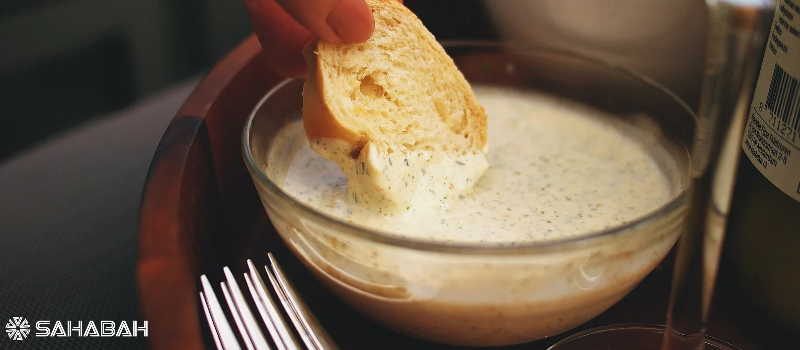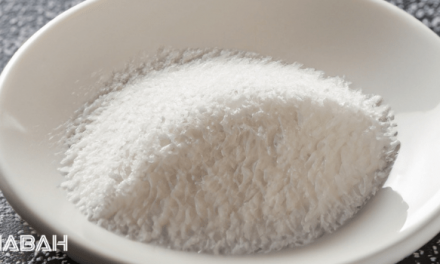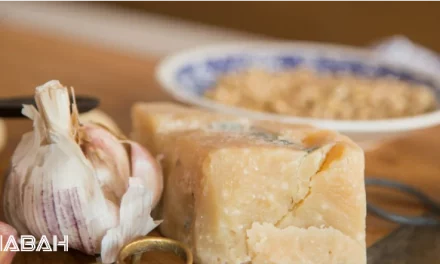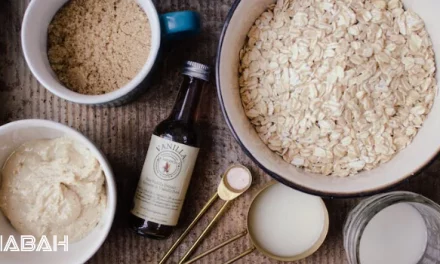Across the Mediterranean region, aioli stands as a beloved and quintessential condiment served alongside or incorporated into various dishes. But the rich, garlicky flavor of this emulsion of olive oil and raw garlic begs an important question – is aioli halal?
For halal consumers, analyzing both the individual ingredients and production process of aioli determines whether this sauce meets Islamic dietary requirements. Read on for a comprehensive guide to understanding what factors make aioli halal or haram.
Defining Real Aioli and Discussing Key Ingredients
Hailing originally from the Provence region of France, aioli draws immense flavor from an abundant amount of raw garlic blended with high quality olive oil. In its traditional form, aioli also contains egg yolks, lemon juice or vinegar, and salt, forming a thick and spreadable emulsion with a distinctive garlicky punch.
Beyond Provence, variations of aioli abound across the Mediterranean which swap in different olive oils, alternative emulsifying agents, and additional flavorings. For example, garlic aioli frequently refers to a version sans egg yolks with textures ranging from thin and sauce-like to nearly as dense as traditional aioli.
As a versatile condiment or cooking component, both restaurants and home cooks utilize aioli to enhance everything from grilled fish, to roasted potatoes, to vegetable dips. The popularity of aioli continues rising globally thanks to its bold and mouthwatering flavor.
Masterfoods, known for their variety of condiments, even produces a mass market roast garlic aioli that delivers punched up garlic intensity. While supermarkets now stock multiple bottled aioli options, few properly replicate the simplicity of ingredients in true, homemade aioli.
These core aioli ingredients shape the overall flavor and determine halal suitability:
Garlic
- As aioli translates directly to “garlic and oil” in Catalan, no aioli can exist without an abundance of garlic. Peeling and mincing 4-12 raw garlic cloves delivers potent flavor and authentic aioli texture.
Olive Oil
- Quality extra virgin olive oil, ideally cold pressed, ties the garlic and other ingredients together in aioli. Standard vegetable oil lacks depth of flavor.
Egg Yolks
- Egg yolks lend aioli its rich, creamy body while also emulsifying the oil and garlic. Using only oil and garlic alone risks a thin, greasy texture.
Lemon Juice
- Bright, tangy lemon juice balances out the robust garlic notes. Lime juice also works in a pinch.
Vinegar
- Some recipes utilize vinegars like champagne vinegar, sherry vinegar or wine vinegar for a more complex tanginess.
Salt & Spices
- Kosher or sea salt, black pepper, cayenne and smoked paprika help seasoning and added dimension.
As we analyze the halal status of aioli, these core ingredients receive scrutiny in terms of their sources, handling methods, and purification. But first, an overview of halal principles.
Principles of Halal Food Standards
Halal roughly translates in Arabic to “permissible” – meaning permitted or lawful under Islamic dietary guidelines. In contrast, haram refers to non-permissible or prohibited foods and ingredients. Interpretation of these Quranic food rules forms the basis of multiple competing halal certification standards.
Globally, halal food certification aims to uphold these main principles:
- Forbidden Ingredient Avoidance – No pork or pork byproducts, alcohol, blood, carrion, etc.
- Humane Slaughter – Livestock and poultry must undergo quick, painless slaughter while invoking blessing.
- Safe Handling & Storage – Preventing cross-contamination from non-halal foods or ingredients.
- Thorough Ingredient Vetting – All components, processing aids and sanitizers receive approval.
- Strict Audit Trail – Comprehensive verification of suppliers and supply chain.
With growing Muslim populations worldwide, halal certification now covers everything from meat to packaged goods to pharmaceuticals. Given varying cultural interpretations and authentication procedure rigor, not all halal labels share equal credibility. Leading certifying bodies include:
- JAKIM (Malaysia)
- MUIS (Singapore)
- UIC (Illinois, USA)
- HFA (Australia)
Depending on locality and food manufacturing infrastructure, third party oversight helps provide assurance where transparency or quality controls falter. For aioli specifically, certifications help benchmark halal standards.
Is Aioli Traditionally Halal? Analyzing Ingredients
Traditionally made aioli contains a rather simple ingredient list of raw garlic, olive oil, egg yolks, lemon juice or vinegar, and salt. Does this make it inherently halal? A deeper look into key components makes aioli’s default halal status less clear cut.
Garlic
As an ubiquitous cooking ingredient across cuisines, garlic on its own is classified as halal suitable under typical Islamic principles. However, processing methodologies could introduce basis for concern.
Potential scenarios where garlic fails halal compliance includes:
- Alcohol or other non-halal solvents used during peeling, chopping or pressing processes.
- Shared equipment with pork or pork-based products without thorough cleaning.
- Use of animal or plant-derived enzymes or bacterials cultures.
When sourcing garlic for halal applications, whole peeled garlic closely guards against cross-contamination while supporting ethical labor practices through small farm cooperatives.
Olive Oil
All olive oil stems from the harvested fruit of Olea europaea trees, classifying it inherently vegetarian, plus full of heart-healthy fats. No major certification bodies list restrictions against olive oil, earning it a place as a beloved halal cooking oil.
However, rare exceptions exist where contamination ruins olive oil’s halal integrity:
- Trace alcohol left over from manufacturing or fermentation processes.
- Reused barrels or containers previously storing wine or other non-halal liquids.
- Batch mixing with cheaper oils like soy, canola or lard-derived ones.
When buying olive oil for halal cooking, choosing reputable suppliers helps mitigate these risks along with requesting halal handlers. Many global olive oil conglomerates like Bertolli comply with Islamic regulations.
Egg Yolks
As a common byproduct of hatcheries and egg production facilities, egg yolk’s halal standing appears straightforward according to JAKIM and Indonesian standards. However, preparation technique and use of additives complicates certification.
Potential ways egg yolk fails halal criteria includes:
- Use of pork or alcohol-based defoaming agents during liquid pasteurization.
- Cross-contact with egg whites or non-halal products during processing.
- No record of stunning practices during poultry slaughtering.
Seeking out certified halal egg yolk products or engaging commercial kitchens with dedicated halal handling procedures limits vulnerability to lapses. Many global brands offer halal egg options including Cal-Maine Foods and Rembrandt Foods.
Vinegar & Lemon Juice
Both vinegar and lemon juice serve key roles in aioli for their bright, tangy balance against rich garlic. However, the choice between wine vinegar, apple cider vinegar and lemon juice proves critical for halal eaters.
All vinegars stem from a two step fermentation process – first into alcohol, then acidified into acetic acid and water. This inherent trace of alcohol typically classifies standard vinegar as haram, however minute.
Exceptions where certain vinegars meet halal standards include:
- Wine vinegar derived organically from 100% halal or tayyib grapes with no sulfites.
- Balsamic vinegar made from pressed halal grapes with no additional alcohol.
- Apple cider vinegar from verified halal or tayyib apple sources.
Lemon or lime juice represents a more flexibly halal citrus foundation for aioli. When sourcing any vinegar or citrus, scrutinizing processing aids like sulfur dioxide and filtering agents is key.
Salt, Spices & Herbs
Table salt avoids alcohol or animal derivatives, earning halal suitability barring additives like iodine. However, quality matters as cheap salt includes free-flowing agents that may rely on pork fat.
Spices face potential cross-contamination with fillers, anti-caking agents and processing equipment that handles non-halal ingredients. Clean label spices pair best for halal diets.
Herbs like parsley, chives and basil pose little halal risk with whole leaves washed and verified fresh. Dried herbs could harbor alcohol residues from processing though, so fresh is ideal.
This analysis shows even basic aioli holds potential stumbling blocks to 100% halal assurance when mass produced.
How Aioli Is Made: Halal Perspectives
Beyond ingredients themselves, the processes by which aioli reaches kitchen tables and restaurants deserve scrutiny by halal consumers. Common concerns include:
Alcohol Usage
Some aioli recipes sneak in white wine, sherry, or even vodka for enhanced flavor. Any form of alcohol strictly prohibits aioli from meeting halal standards. Even certain vinegars like wine, champagne or sherry introduce traces of alcohol leftover from fermentation.
Shared Equipment & Handling
Few commercial production kitchens maintain dedicated halal prep zones. Without stringent protocols, equipment that processes pork or mixes alcohol-based recipes risks cross-contacting aioli batches. Minor residues easily transfer via knives, mixing bowls, whisks and containers.
Recipe Substitutions
Mass manufactured aioli frequently swaps cheaper or more shelf-stable oils for olive oil, including soybean, canola and vegetable oils often refined using animal fat and alcohol solutions. Egg yolks also disappear in favor of thickeners like xanthan gum.
Without supply chain transparency or third party auditing, commercial aioli buyers remain largely ignorant of backdoor ingredient alterations incompatible with halal standards.
Labeling Issues
Given loose legal standards on using the term “aioli”, products labeled as aioli could secretly rely on eggs instead of egg yolks while listing “spices” that hide alcohol extracts. Without careful label vetting, incomplete ingredients leave proportion questions unanswered.
Home cooks bypass these risks by hand selecting ingredients, controlling oil quality, properly segregating equipment and avoiding cross-contact with any non-halal item throughout the aioli making process.
Seeking & Preparing Verified Halal Aioli
Between murky ingredient sourcing and uncontrolled manufacturing conditions, mainstream retail aioli often fails Muslim dietary standards even when appearing halal on its face. What options exist for reliably halal aioli?
Evaluating Certified Retail Products
Currently no flagship aioli products boast official halal certification by major authorities like JAKIM or MUIS. However boutique brands go the extra mile. For example, World Foods produces halal-labeled garlic aiolis relying on sunflower oil and egg-free thickeners. Small batch producers willing to pursue certification lead the way for conscientious quality.
When evaluating pre-made aioli, check for the following reassuring signs:
✔️ No alcohol or alcohol derivatives called out on label
✔️ Lists olive oil instead of just “vegetable oil”
✔️ Marks eggs specifically as opposed to ambiguous “emulsifier”
✔️ Shows halal or business certification logos (i.e. UIF, HFCE standards)
✔️ Indicates equipment segregation and sanitization policies
✔️ Provides an 888 or 786 symbol signaling halal compliance
✔️ Offers contact info to inquire about precise production details
Still uncertain? Double check by querying certification bodies like IHI Alliance or JAKIM directly by contacting their public feedback channels.
Making Your Own Halal Certified Aioli Sauce
When in doubt over retail aioli, many halal consumers choose to diy their own aioli at home. This requires procuring certified halal pantry ingredients:
✔️ Olive Oil – Numerous halal oils available, especially from Muslim-majority regions like Palestine or Tunisia.
✔️ Garlic – Sourcing whole peeled garlic limits potential cross-contamination.
✔️ Eggs/Egg Yolks – Seek out certified halal eggs from ethical suppliers.
✔️ Vinegar – Non-alcohol based like apple cider or verified balsamic vinegars.
✔️ Lemon Juice – Look for organic lemon juice with minimal processing aids.
✔️ Salt & Spices – Clean labels with no anti-caking agents or allergens.
From there, keep equipment like mixing bowls, whisks, knives and jars separate from those touching pork or alcohol. Basic homemade aioli only requires 10-15 minutes of hands on prep and yields a tangy, crisp flavor no bottled imitation matches.
For easy step-by-step guidance, see this homemade halal aioli recipe:
Ingredients:
- 3 Large Garlic Cloves, Peeled & Minced
- 2 Egg Yolks
- 3/4 Cup Olive Oil
- 1 Tbsp Lemon Juice
- 1/4 Tsp Salt
- 1/8 Tsp Cayenne Pepper
Directions: 1) In a wide bowl, mash garlic into a paste with a pinch of salt using the back of a spoon. 2) Mix in egg yolks until blended then slowly drizzle olive oil while continuously whisking. 3) Once emulsion forms, mix in lemon juice, salt and cayenne pepper. 4) Taste and adjust seasoning if desired. 5) Transfer to an airtight container and refrigerate up to 4 days.
Making your own allows total control over the quality and halal integrity of the ingredients. Share your homemade garlic glory with halal-conscious friends!
Conclusion: Key Takeaways on Halal Status of Aioli
In closing, while many basic aioli recipes meet Muslim dietary standards, the halal status of aioli ultimately depends on strict oversight throughout the production pipeline. Between alcohol additions, shared equipment with haram foods, opaque supply chains and improper substitutions, commercial aioli often sidesteps halal requirements.
Until more brands pursue halal certification and manufacturing transparency, the most reliable method for enjoying true, halal aioli requires handcrafting this iconic sauce yourself.
Fortunately, quality ingredients like ethical olive oil, vinegar alternatives and halal sourced eggs skip complex supply chains while supporting moral producers. Home cooks also control the prep environment – preventing any cross-contamination while delighting in brighter, fresher flavors.
So next time garlic cravings strike or you need the perfect halal dipping sauce, embrace the old world tradition of aioli with ideal ingredients in your own kitchen. Then kick back and enjoy Mediterranean flavors as they were meant to be – smooth, pungent and unmistakably halal.
Frequently Asked Questions: Is Aioli Halal?
The halal status of garlic aioli depends on the ingredients used in its preparation. Generally, garlic aioli made with halal ingredients such as mayonnaise and minced garlic is considered halal.
What is aioli and is it halal?
Aioli is a sauce made with garlic, olive oil, and sometimes egg yolks. Its halal status depends on the ingredients used and whether it meets the requirements of halal dietary laws.
How can I check the halal status of aioli or any other food?
You can check the halal status of aioli or any other food by looking for a halal certification or verifying the ingredients used in its preparation.
Is Masterfoods Roast Garlic Aioli halal?
The halal status of Masterfoods Roast Garlic Aioli depends on its ingredients. It is important to check the label or packaging for a halal certification or verify the ingredients to determine its halal status.
What are the requirements for aioli to be considered halal?
In order for aioli to be considered halal, it should be made with halal ingredients and meet the requirements of halal dietary laws according to Islamic dietary guidelines.
Can I consider aioli halal if it is made with tahini?
Aioli is traditionally made with garlic, olive oil, and sometimes egg yolks, and does not typically include tahini. It is important to ensure that aioli made with added ingredients such as tahini meets the requirements of halal.
Is aioli made with halal meat considered halal?
Aioli is not traditionally made with meat. However, if it is made with halal meat, it is important to ensure that all ingredients used in the preparation of aioli, including the halal meat, meet the requirements of halal dietary laws.
How can I determine the halal status of a specific aioli product?
To determine the halal status of a specific aioli product, you can check the label or packaging for a halal certification, and verify the ingredients used in its preparation to ensure it meets the requirements of halal.
What should I do if I have doubts about the halal status of aioli?
If you have doubts about the halal status of aioli, it is recommended to contact the manufacturer or a halal certification authority to clarify any concerns and ensure the product is halal according to Islamic dietary laws.
Is garlic aioli generally considered halal?
Yes, garlic aioli is generally considered halal when it is made with halal ingredients such as mayonnaise and minced garlic, and meets the requirements of halal dietary laws.





